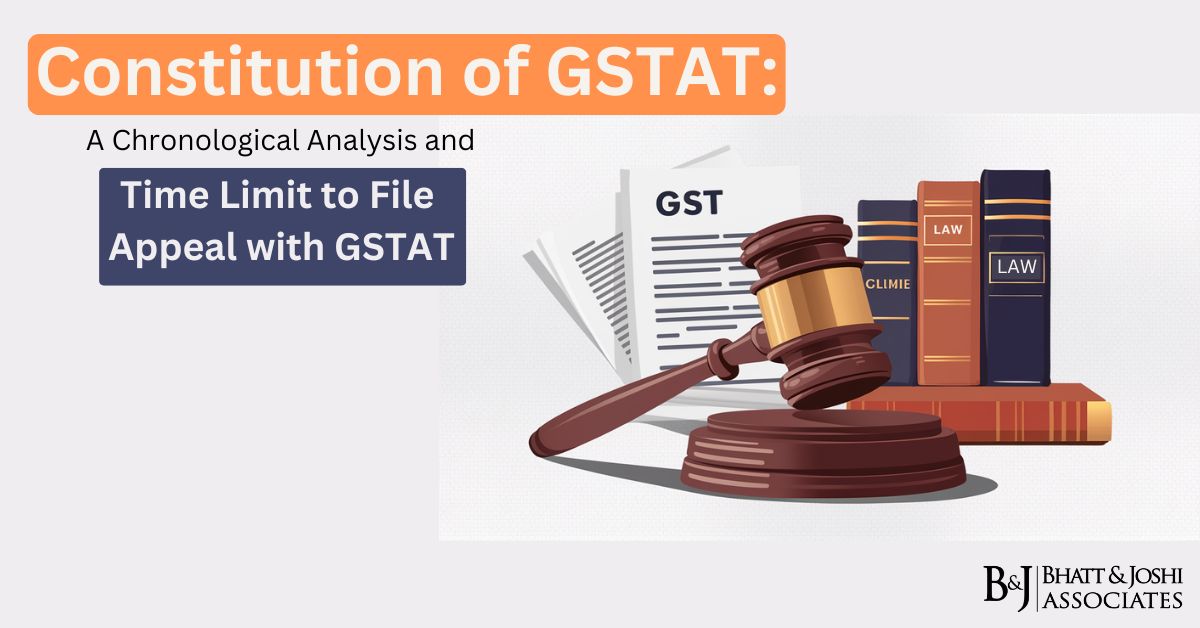Introduction
The Goods and Services Tax Appellate Tribunal (GSTAT) plays a critical role in adjudicating disputes arising under the GST regime. Its formation and operationalization have been subjects of extensive discussion and legal scrutiny. This article provides a detailed analysis of the GSTAT’s constitution, the timeline for filing appeals, and the relevant legal provisions governing this process.
Background and Need for GSTAT
Introduction of GST and Legal Framework
The introduction of the Goods and Services Tax (GST) in India marked a significant reform in the country’s indirect tax system. It subsumed various central and state taxes into a single tax regime, aimed at simplifying tax compliance and eliminating the cascading effect of taxes. To resolve disputes under this new tax regime, the Constitution (One Hundred and First Amendment) Act, 2016, introduced the GSTAT as the final fact-finding authority.
Role and Importance of GSTAT
The GST Appellate Tribunal (GSTAT) is envisaged as an independent quasi-judicial body to hear appeals against the orders passed by the Appellate or Revisional Authorities under the GST laws. It ensures uniformity in the interpretation of the law and provides taxpayers with a reliable forum for dispute resolution.
Chronological Development of GSTAT
Initial Provisions and Delays
The GSTAT’s establishment was initially provided under Section 109 of the Central Goods and Services Tax (CGST) Act, 2017. However, the actual constitution of the tribunal faced several delays due to procedural and administrative challenges.
Key Milestones:
– *July 2017:* GST regime comes into effect.
– *2017-2018:* Initial procedural delays in constituting GSTAT.
– *2019:* Legal challenges and amendments to address issues related to tribunal composition.
Supreme Court’s Intervention
In the case of [Union of India v. Madras Bar Association (2020)], the Supreme Court emphasized the importance of constituting the GSTAT promptly to ensure an effective appellate mechanism under the GST laws. The court directed the government to expedite the process.
Recent Developments
Recent amendments and notifications have addressed several structural issues related to the tribunal. The government has taken steps to operationalize the GSTAT, with appointments and infrastructure development underway.
Legal Provisions and Time Limit for Filing Appeals
Relevant Sections and Rules
[Section 109 of CGST Act, 2017]
Section 109 of the CGST Act, 2017, outlines the establishment and structure of the GSTAT. It provides for the appointment of judicial and technical members to the tribunal.
[Section 110 of CGST Act, 2017]
Section 110 details the qualifications, tenure, and conditions of service of the members of the GSTAT.
[Section 112 of CGST Act, 2017]
Section 112 specifies the procedure for filing appeals to the GSTAT. It mandates that any person aggrieved by an order passed by the Appellate Authority can file an appeal to the GSTAT within three months from the date of communication of the order.
Time Limit and Extensions for filing appeal with GSTAT
The time limit for filing an appeal with the GSTAT is three months from the date of communication of the order by the Appellate Authority. The tribunal has the discretion to extend this period by a further three months, provided there is sufficient cause for the delay. This section provides critical insights into the GST appeals process and the legal framework governing it.
Case Law: Apex Court’s Interpretation
In various rulings, the Supreme Court has emphasized the importance of adhering to the prescribed timelines for filing appeals. The court has also highlighted the GSTAT’s discretionary power to condone delays in genuine cases where sufficient cause is shown.
Practical Considerations and Compliance for filing appeal with GSTAT
Documentation and Procedural Compliance
Taxpayers must ensure that all necessary documents and evidence are in order when filing an appeal with the GSTAT. Proper documentation and adherence to procedural requirements are crucial for the successful admission of appeals.
Professional Assistance
Given the complexities involved in GST litigation, it is advisable for taxpayers to seek professional assistance from legal and tax experts. Experienced professionals can provide valuable guidance on the procedural aspects and help in presenting a robust case before the tribunal.
Conclusion
The constitution of the GST Appellate Tribunal (GSTAT) marks a significant step towards strengthening the dispute resolution mechanism under the GST regime. While the tribunal’s operationalization has faced delays, recent developments indicate progress towards making it fully functional. Adhering to the prescribed timelines and procedural requirements is essential for taxpayers seeking to file appeals with the GSTAT. The tribunal’s role in ensuring uniformity and fairness in the interpretation of GST laws underscores its importance in the overall tax administration framework.














